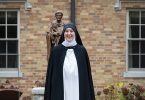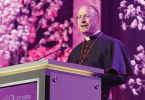
Past-Supreme Knight Virgil Dechant addresses nearly 600 Knights of Columbus and their guests on May 5 during the banquet held as part of the Knights of Columbus 111th state convention held at Topeka’s Ramada Inn. Dechant served as Supreme Knight from 1977 until his retirement in 2000. By Marc Anderson.
Knights of Columbus hold 111th annual convention in Topeka
by Marc and Julie Anderson
mjanderson@theleaven.org
TOPEKA — The theme for the 111th annual state convention of the Knights of Columbus was “Let’s Celebrate,” and that they did, adding faith and fraternity into the mix with fun.
More than 600 Knights met from May 4 to 7 for the convention held at the Ramada Inn in downtown Topeka. The event was hosted by Christ the King Council 8411 and St. Matthew Council 13012.
The Knights had the opportunity to review activities of the past fraternal year, elect state officers for the upcoming year and enjoy fellowship through social activities like a golf tournament and a barbecue.
Over the convention weekend, the Knights attended a Mass celebrated at St. Matthew Church by Archbishop Joseph F. Naumann, had an opportunity for eucharistic adoration, and heard former Supreme Knight Virgil C. Dechant speak at the convention banquet held Saturday night.
Dechant, a native of Liebenthal, joined the Knights of Columbus in 1949 at Council 2340 in Liebenthal. Two years later, he was elected Grand Knight of the council.
He rose through the organization, eventually serving in the position of supreme master of the fourth degree and assistant supreme secretary in 1966. He became supreme secretary under Supreme Knight John William McDevitt in 1967. In January 1977, upon McDevitt’s retirement, he was elected the twelfth Supreme Knight, a position he held until his retirement in 2000 at the age of 70.
In his keynote address, Dechant spoke on the fourth and final pillar of the fraternity’s four pillars of charity, unity, fraternity, and patriotism. More specifically, he addressed how the Knights should lead the way in protecting the most fundamental of freedoms — that of religious freedom.
Dechant shared how the Founding Fathers did not intend to remove religion from the public square altogether, but to allow religion to serve as a guiding force in the country’s daily life.
“In his farewell address, George Washington insisted that ‘religion and morality are indispensable supports’ to our political prosperity,” Dechant said.
Thomas Jefferson also held this view, proved by his words inscribed on the walls of the Jefferson Memorial in Washington, D.C.: “God who gave us life gave us liberty. Can the liberties of a nation be secure when we have removed a conviction that these liberties are the gift of God?”
“A great deal hinges on how we answer that question,” said Dechant.
In the early 1950s, recounted Dechant, the Knights of Columbus played a major role in urging Congress to adopt the words “under God” in the Pledge of Allegiance.
“Those words were placed in our pledge in part to mark a stark contrast between both our source of rights and the behest of the atheist, totalitarian dictatorships of the 20th century,” he said.
Current threats to religious liberty, he explained, such as the Health and Human Services mandate for Catholic employers to provide insurance coverage for services contrary to Catholic doctrine, go against the very core of the Founding Fathers’ intentions as to the role religion and government should have in society.
“We value religious liberty — not only because it affects our personal lives, but we value religious liberty because of the good religion brings into the lives of individual believers and into the life of our nation,” he said.
In his concluding remarks, Dechant discussed how the late Blessed John Paul II began his pontificate with the now-famous words: “Do not be afraid; open wide the doors to Christ.” He told the Knights to not be afraid, but to confront any threats to religious liberty, first and foremost, through prayer.
“May we, like Blessed Pope John Paul, be not afraid on this issue,” he said.






